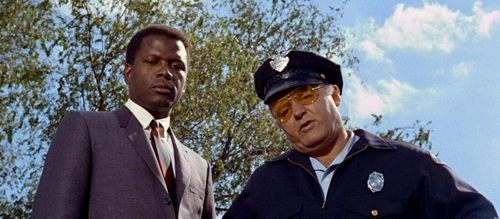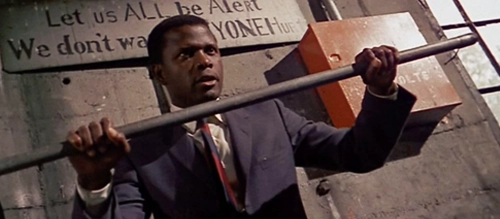In the Heat of the Night (1967) Review

In the Heat of the Night (1967)
Director: Norman Jewison
Screenwriters: Stirling Silliphant
Starring: Sidney Poitier, Rod Steiger, Warren Oates, Quentin Dean
The mosquitos buzz in the humid night of Sparta, Mississippi as detective Sam Woods (Warren Oates) discovers the murdered industrialist, Philip Colbert. Virgil Tibbs (Sidney Poitier) is waiting at the train station after visiting his mother; he has money in his wallet and he’s a stranger passing through the town. Usually, more evidence is needed when accusing someone of murder, but this is 1960s America and Virgil Tibbs is a black man. Officer Woods doesn’t need any other reason to arrest him.
In the Heat of the Night was released in the late sixties when racial bigotry and prejudice was often the norm across the United States; segregation laws were only just coming out of force and the Civil Rights Movement was flourishing. While the film is predominantly a crime noir and odd couple cop drama, it is also highly political as the Northern Virgil navigates the Deep South.
Back at the police station, Police Chief Gillespie (Rod Steiger) is introduced. At first, he is thrilled to have a baffling murder tied up so swiftly. But it isn’t long before Woods and Gillespie have their mistake pointed out to them. It turns out Virgil Tibbs is a celebrated police detective from Philadelphia. When his own Chief suggests this small town might benefit from a big city slicker, Virgil is as reluctant as Gillespie. But, of course, the two strike up an unlikely friendship.
In Sparta, where African Americans are seen picking cotton on a plantation, the idea of a black man holding a job of repute and expecting respect is extremely unexpected. And very hard for the people to fathom. Virgil’s involvement in the police investigation causes much tension in the town and offers us a close-up portrayal of the discrimination black Americans experienced.

When compared to more radical, visceral looks at racial discrimination in America – Mississippi Burning (1988), Do the Right Thing (1989), Get Out (2017), among many others – In the Heat of the Night does seem quite tame, and is therefore more comparable to To Kill a Mockingbird (1962) and Poitier’s other film that year Guess Who’s Coming to Dinner (1967). But an important thing to remember is that In the Heat of the Night was written and shot during the time it was portraying, in a much less progressive Hollywood. As sanitised as this look at inequality is, In the Heat of the Night was massively important for cinema. It paved the way for those more realistic, impactful, and provoking films to follow in the subsequent decades.
Norman Jewison’s direction sees In the Heat of the Night hit all the visual high notes of a successful crime movie. Long takes and slow-moving camera movements build tension, with many scenes filmed in the shadowy night. It’s a useful backdrop to a story with all the twists and wrong turns you might expect. The culprit is as unlikeable as any movie villain and there is a young damsel in the mix. In addition, the flawed protagonist often found in crime noirs is embodied by Rod Steiger, whose no-nonsense gum-chewing Police Chief is certainly imperfect, and is in no way a beacon of progression, but is a product of his time. His willingness to question stereotypes, and his growth throughout the film, make him ultimately likeable.
Poitier’s Virgil is positively saintly in comparison. His ability to remain graceful in the face of what he is experiencing is a superpower. His strong conviction in himself and his rights are such a juxtaposition to the beliefs he is forced to confront in others. When the rich white Eric Endicott (Larry Gates) slaps Virgil for some perceived impertinence, Virgil slaps him right back – it is a brief moment where Virgil drops his guarded exterior, and it is exhilarating. Oddly this act of violence softens Virgil, and it is arguably more memorable than who the murderer turns out to be.
In the Heat of the Night still holds its own as a detective thriller, and as a film questioning the politics of the time it was portraying. Upon its release it was critically acclaimed, racking up nominations and wins across many of the prestigious awards, including Best Picture at the Oscars. A gripping story, incredible acting and solid direction, combined with its determination to shine a spotlight on inequality, has ensured that In the Heat of the Night has gone down in history as one of the greatest films ever made.
Score: 23/24

